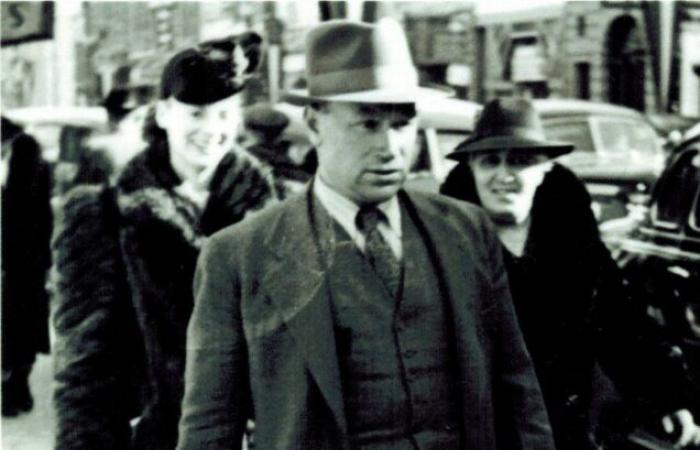OTTAWA — As a member of the Communist Party in Calgary in the early 1940s, Frank Hadesbeck performed administrative tasks at the party office, printed leaflets and sold books.
But he also had tasks that his party comrades couldn't know anything about: he snooped through mail, copied phone numbers from notepads and rummaged through trash cans.
Mr. Hadesbeck, known to his Royal Canadian Mounted Police (RCMP) agents as Agent 810, passed on any information he could glean to the national police.
His long tenure as a paid informant for the RCMP's security branch is chronicled in “A Communist for the RCMP” by Dennis Gruending, a former NDP MP who worked as a journalist and wrote several books.
Before the First World War, Frank Hadesbeck's family left what was then southern Hungary for Canada, settling in Saskatchewan. Frank had a difficult childhood. Orphaned at age 11, he worked on farms, spent time in the United States and held several jobs in the Regina area in the 1930s.
He was among the Canadians who volunteered to fight on the Republican side in the Spanish Civil War against General Francisco Franco.
Frank Hadesbeck was alone, broke and looking for work in Alberta when the RCMP recruited him as an informant, on the condition that he join the Communist Party to establish a cover.
A few days later, at an RCMP office, he was fingerprinted, weighed and photographed.
“My contact told me that I was not an informant, nor a whistleblower, nor a snitch as other informants were classified,” Mr. Hadesbeck wrote in his notes. “I was part of a team that received a monthly salary, plus expenses, and I was given a number.”
A secret well kept by the RCMP
The RCMP has always jealously guarded information about its sources, even decades after the events, writes Dennis Gruending. He formally requested the Frank Hadesbeck file under the Access to Information Act, but no official has confirmed or denied the existence of the files.
However, Hadesbeck himself has carefully documented his efforts for the RCMP over the decades. The author acquired a box of his documents through an acquaintance and managed to corroborate and support many of the informant's claims.
The files contain the names of hundreds of people on so-called “watch lists,” individuals who were of interest to RCMP security officials who were increasingly concerned about the perceived threat of communism during the Cold War.
The files also detail Frank Hadesbeck's functioning as an agent, his relationships with his liaisons, his thoughts on ethics and his insight into his double life, notes Dennis Gruending.
RCMP security officers wanted information on people they considered subversive, but did not want to understand why these people were critical of the existing economic and political system, the book says.
Frank Hadesbeck seemed to have a clear idea of his mission.
“I quickly realized that I was being paid only to gather information, without thinking about why they wanted all this information on people I thought were honest Canadian citizens.”
The informant met with a liaison every two weeks, often in a hotel room. The agent usually provided him with the names and photos of people he was interested in and asked him to make discreet searches.
Cash payments from the RCMP supplemented his salary from his steady job, since the early 1950s, with a Regina company that salvaged old tractors.
Individuals “to watch”
Frank Hadesbeck's notes and watch lists from the 1950s hint at the RCMP's suspicions of communist control of the peace movement.
Socialist pioneer Tommy Douglas, who attended many peace-related events, was listed alongside dozens of others on watch lists. A handwritten list labeled the Canadian Peace Conference and Voice of Women as fronts for the Communist Party.
Tommy Douglas was premier of Saskatchewan and later led the federal New Democratic Party, but the author argues that the RCMP did not care much about distinguishing between communists and social democrats.
“The police continued to believe that Douglas was secretly a communist, or at least unduly influenced by them.” Indeed, an RCMP file on Mr. Douglas, which contains more than 1,100 pages, was discovered thanks to the Access to Information Act in 2006.
Mr. Hadesbeck scribbled half a dozen notes about the writer Farley Mowat, another subject of curiosity for the security service.
Many prominent Canadians were on his watch lists, including author Pierre Berton, journalist June Callwood, musician Stompin' Tom Connors, Liberal cabinet ministers Walter Gordon and Herb Gray, and radio presenter Adrienne Clarkson, who would become more later Governor General.
Dennis Gruending claims that Frank Hadesbeck not only routinely betrayed members of the Communist Party, but was also reckless in passing on information about many other people.
“He often suggested that they may have been party members when they were not,” he writes.
Sometimes such an examination could have serious consequences.
Those deemed suspicious by the RCMP were harassed, denied employment or promotion, or even fired from government, unions, the media and academia, the author notes. Gay and lesbian members of the Canadian Armed Forces, the RCMP and the public service were among those targeted.
“Careers have been ruined and lives shattered.”
At a November meeting in Ottawa to promote the book, Dennis Gruending said he had mixed feelings toward Frank Hadesbeck, “and I think he was somewhat mixed in his feelings toward people that he was watching.”
“I have a lot of sympathy for him, but ultimately he betrayed a lot of people.”
In September 1976, the informant was invited to a meeting at the Regina Holiday Inn with several RCMP officers.
He was told his career with the RCMP was over.
“I had to sign a paper, but I did not have a copy for myself, according to which I would keep my links with the security forces secret and would no longer contact them in any way,” says Frank Hadesbeck in his notes.
He was given 15 $100 bills as severance pay.
Despite this, the man provided information to the RCMP until 1977, and occasionally for a few more years.
“Hadesbeck's behavior is difficult to understand, as he found his sudden dismissal traumatic,” the book reads. “He believed he deserved, and was promised, a pension when he retired.”
The former informant seemed eager to tell his story in the 1980s, but his book project fell through.
He died in 2006, shortly after turning 100.
In his later notes, he tried to present himself as a patriot and an anti-communist, but his statements seemed unconvincing, writes Dennis Gruending.
“It is easy to see Hadesbeck as a deceptive, cynical, and selfish man. He did not become an informer for ideological reasons or out of patriotism. He did it for the money and perhaps for a feeling of power and excitement.”






